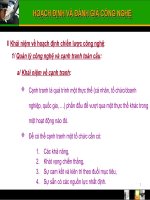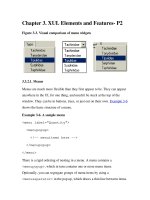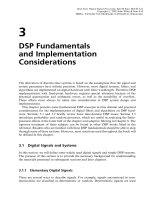Chapter 3 transport operation
Bạn đang xem bản rút gọn của tài liệu. Xem và tải ngay bản đầy đủ của tài liệu tại đây (5.99 MB, 72 trang )
HO CHI MINH CITY UNIVERSITY OF TRANSPORT
Chapter 3:
Transport operation
PRESENTED BY: BICH HOAI, MSc.
1
Contents
• International trade
• Outsourcing and self-operation
• Cost and pricing issue
• Transportation of OOG
2
Aspects of International Trade
Parties and Tasks
Agent
3
Aspects of International Trade
Parties and Tasks
Types of Agents on the Trading of Goods:
• Factors, persons in possession of goods belonging to their Principal to
be sold for the benefit of the Principal;
• Brokers, namely persons who conduct negotiations on behalf of Buyers
and Sellers;
• Commission Agents, namely persons who enter into contracts with third
parties in their own name, although they do not do so as agents;
• Confirming Houses, namely persons who take on the role of an agent
for an overseas buyer who is interested in buying goods from a seller in
the country;
• Del Credere Agents, namely persons who take on additional risks
4
Aspects of International Trade
Parties and Tasks
Roles of an Agent on the Trading of Goods
•
•
•
•
•
•
•
•
•
•
•
to market a particular product;
to penetrate a market known especially to the Agent;
to secure sub-agents to sell the product;
to elicit information relevant to the Principal’s business;
to represent the Principal;
to secure credit on behalf of the Principal;
to procure certain goods or services for the Principal;
to procure freight space;
to procure finance from banks and lenders;
to secure insurance for the goods;
to secure legal advice in a foreign country.
5
Aspects of International Trade
Parties and Tasks
Types of Agents on the Carriage of Cargo:
• Loading Brokers, who conduct loading operations;
• Forwarding Agents, whose duties are determined by the contract.
Their role and duties are open to agreement.
6
INTERRELATION BETWEEN INTERNATIONAL TRADE AND FORWARDING
ACTIVITIES
Legal position of the Freight Forwarder
Two different legal positions of a freight forwarder
are possible:
• Acting as an Intermediary organizing the transport and ancillary
services and choosing the carriers and service providers in its own
name for and on account of the customer (= traditional freight
forwarder) or
• Acting as Principal by undertaking in its own name and on its own
account to secure the movement of goods from A to B for a
customer but then entering into a series of contracts with
performing carriers to fulfil the head contract.
INTERRELATION BETWEEN INTERNATIONAL TRADE AND FORWARDING ACTIVITIES
Classic Transport:
Shipper
Forwarder
Trucker
Warehouse
Airline
Railway
Ship-owner
Forwarder acts as
intermediate
Multimodal Transport:
Shipper
MTO
Trucker
Warehouse
Airline
Railway
Shipowner
MTO acts as
carrier
Incoterms
9
WHAT ARE INCOTERMS?
INCOTERMS 2000: There are
thirteen (13) terms of delivery.
The latest edition of these
terms is the INCOTERMS 2010,
11 Rules.
Coming up INCOTERMS 2020
10
WHY ARE INCOTERMS SO IMPORTANT?
Avoiding misunderstanding of different
cultures and languages.
INCOTERMS tell us what to do in respect
to:
• Carriage of goods from seller to
buyer.
• Export and import clearance.
11
WHATARE
ARE INCOTERMS
INCOTERM SO IMPORTANT?
WHY
INCOTERMS also explains the division
of costs and risks between the seller
and buyer.
The importer is possible to calculate
the true landed cost of a product
12
HISTORY OF INCOTERMS
1936
1953
1967
1976
1980
1990
2000
2010
2020
13
THE TWO GROUPS OF INCOTERMS
Group 1 - Rules for any Mode and Modes of Transport
EXW: Ex Works (named place)
FCA: Free Carrier (named place)
CPT : Carriage Paid To (named destination)
CIP: Carriage and Insurance Paid to (named destination)
DAT: Delivered At Terminal (named port or place) / (DPU:
Delivery at place Unloaded, Incoterms 2020)
DAP: Delivered at Place (named place)
DDP: Delivered Duty Paid (named destination place)
14
THE TWO GROUPS OF INCOTERMS
Group 2 – Rules for Sea and Inland Waterway Transport Only
FAS :Free Alongside Ship (named loading port)
FOB: Free On Board (named loading port)
CFR: Cost and Freight (named destination port)
CIF: Cost, Insurance and Freight (named destination port)
15
Incoterms
Principles
Delivery conditions, not payment conditions!
Seller and buyer agree on the delivery of goods.
Usually, they refer to standardized terms.
This speeds up the process and increases the transparency and mutual understanding.
Incoterms (= International Commercial Terms), are
prepared by the International Chamber of Commerce.
They do not apply unless they are expressly incorporated into the contract. They have
no binding force of law.
More info: www.incoterms.com
16
Incoterms
Principles
Relationship: between seller and buyer,
not between seller / buyer and carrier!
Forwarders, shipbrokers, stevedores and carriers
are intermediaries, who instructed by the seller or the
buyer,
contribute towards the carrying out of these terms.
17
Incoterms
Principles
Critical Point =
The moment in the route of the goods
at which the responsibilities are transfered
from the seller to the buyer.
We distinguish 3 critical points:
1.
2.
3.
Transfer of Costs;
Transfer of Risk;
Transfer of Documents.
18
Logistics and Outsourcing
Logistics Input
Natural
resource
Information
resource
Executive
Logistics management
Raw
material
Semiproducts
Product
Logistics activities
•Customer service
•Forecast
•Inventory
•Logistics Information
•Material handling
•Order processing
•Supported activities
Advantage
competitive
Control
•Placing
•Acquisition
•Packaging
•Reverse Logistics
•Transport
•Warehousing
Customers
Financial
resource
Planning
Suppliers
Human
resource
Logistics Output
Management
Time and place
added value
Efficient
transport
Owner asset
Source: International logistics
19
Relationship between main and support activities
Customer
service
Acquisition
20
Outsourcing
• Transfer part of the functions and
tasks of the enterprise to outsource
• Principles:
• Keep your self the jobs that you
know you will perform better than
others
• Transfer to third parties what they do
better than yourself and others
• Outsource activities what you are
able to manage
10/5/2020
By: Bích Hồi, MSc.- UT
21
Why outsource?
• Cost save
• Effectiveness ensure
• Little working space
• Time save
• Quality ensure
• Ensure works
continuously.
10/5/2020
By: Bích Hồi, MSc.- UT
run
smoothly/
22
Outsourcing of Logistics
Tasks and parties
Tasks
Strategic: Design
Tactical:
Chain management
Operational
Assets, Execution
10/5/2020
Parties
1PL
2PL
3PL
4PL
Shipper
Shipper
Shipper
Consultant
Shipper
Shipper
LSP
LSP
Shipper
Subcontractors
Subcontractors
Subcontractors
MSc. Bích Hồi UT
23
2PL
Facility logistics
1PL
Work place logistics
10/5/2020
1980’s
1970’s
3PL
Corporate logistics
Supply chain management
Manage a complex service
chain
1960’s
4PL
Supply chain Logistics
Manage all stakeholders in a
supply chain by electronic data
Traditional warehouse and
Transport management
1950’s
5PL
Global
Logistics
1990’s
Logistics’ levels
Self-logistics
By: Bích Hồi, MSc.- UT
24
Low
• Efficiency: Produce at the
lowest price or provide the
product with the highest
value difference.
Service value
• Competitive
advantage:
From a cost or value
advantage in product or
service or both.
high
Logistics and competitive advantage
Lợi thế về dịch vụ và
chi phí
Cost and value
advantage
Lợi thế về dịch vụ
service advantage
Lợi thế về chi phí
Cost advantage
Thị trường bão hịa
Market saturation
Low
10/5/2020
By: Bích Hoài, MSc.- UT
Cost
High
25









